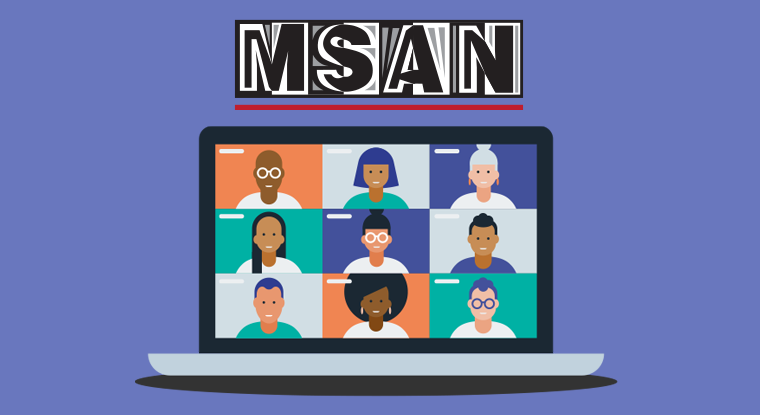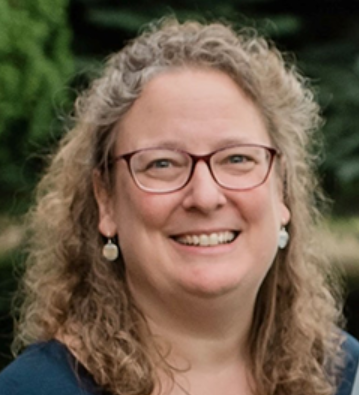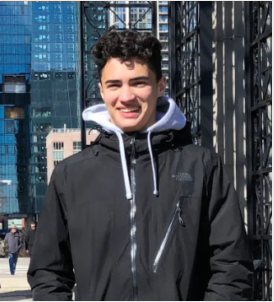Annual MSAN Student Conference Draws More and Younger Students After Going Online
Pandemic as plus for equity-centered educators and students
October 27, 2021 | By WCER Communications

MSAN's 2020 and 2021 high school student conferences were able to include younger students, which has long been a project goal.
It may seem counter-intuitive, but the COVID-19 outbreak is proving beneficial in a key way for one pivotal UW−Madison project aimed at developing student leaders from across the country who are equipped to end racial disparities in academic achievement and opportunity.
WCER’s MSAN Consortium of multiracial school districts is moving its annual conference for high school students online this year, just as it did last fall for the first time because of the pandemic. As a result, organizers have been able to expand access to the program that kicks off Wednesday to more students, including younger ones, which has long been a goal, MSAN Executive Director Madeline Hafner says.
“One of our dreams at MSAN has been to replicate what is so amazing about our high school conference for our middle school students, but that’s very hard to do when kids have to travel,” Hafner says, noting districts would have to pay for more chaperones for younger students to alleviate concerns.
“But when we do it virtually, they could all come,” she adds. “One of the gifts of the pandemic was being able to open up the conference virtually to middle schools.”
At the same time, the main goals and features of the annual student conference – known this year and last as the MSAN Intersectional Social Justice Collaborative – remain identical to what past conferences have provided in person for over 20 years to 200 or more mostly students of color and their advisors.

MSAN Consortium Executive Director Madeline Hafner
“The core concepts are the same: introducing them to social science research on racial identity, offering motivational speakers, exposing them to conversations with students from other districts and then culminating in the creation an equity action plan,” Hafner says. Action plans are equity-enhancing projects that each student team develops and then works to enact back in their home district – such as adding an ethnic studies class or holding a local MSAN conference, to name two recent examples – often with a mentoring component focused on students helping students that reinforces MSAN’s over-arching goal of bridging racial gaps.
“You can see this emphasis on a mentoring component throughout the years,” Hafner says. “It’s important because some of what is baked into what people know about how to be successful in school, some kids just don’t have that experience or have that sort of intangible knowledge. Mentoring is one way to make explicit the key steps in navigating school successfully.”
Now in its 22nd year, MSAN is a national coalition of 28 multiracial school districts from mostly the Midwest and the East Coast working together to understand and change school practices and structures that keep racial academic and opportunity gaps in place. As a network of equity-focused districts, MSAN conducts research, shares best practices, analyzes policies and engages in professional development.
In another break from the pre-pandemic years, the 2021 online conference is structured to work better for a virtual audience. Instead of being held on-site in a member district for four straight days filled with speakers, tours, activities and project work, this year’s virtual conference is divided into shorter sessions spread out over several months, to make the content more manageable for online consumption.
Starting Wednesday, the sessions will take place once a month on a single day for two hours a day – 11 a.m. to 1 p.m. CT over Zoom – from October through April. The first session features introductions, a thematic focus on how students see themselves vs how others see them, and remarks from a panel of MSAN graduates sharing how their MSAN experiences shaped them.

MSAN graduate Nick Rosenfeld
Loyola University Chicago junior Nick Rosenfeld will be one of the panelists. Rosenfeld was born and raised in Evanston, Illinois, and was an MSAN student from Evanston Township High School. He is Muslim, of mixed North African and white descent, and is a first-generation college student. He is studying biology, and credited MSAN for putting him in touch with other exceptional students of color.
“MSAN was my first opportunity to directly impact students who looked like me in my own community,” he says. “Not only that, MSAN surrounded me with other students of color who were highly motivated and passionate about creating change in the system.”
As the academic year plays out, MSAN conference participants will hear from leading researchers and from advocates for social justice, with a continuing emphasis on ways that the students can act as agents of social change. Nationally renowned speakers will include Bettina Love, a University of Georgia professor and co-founder of the Abolitionist Teacher Network, and University of Illinois-Chicago Professor David Stovall, who will discuss community organizing, housing and gentrification, as well as how the students can be activists in their own neighborhoods.
Other session topics include body positivity, physical and mental health, collectivism and collaboration, and, in January, the new topic of being agents for change for the climate, presented by Chief Dana Tizya-Tramm of the Vuntut Gwitchin First Nation in the Northern Yukon. At 34, he is the youngest chief of an indigenous tribe in Canada, and is recognized as a leading voice on how climate change affects the North.
Conference organizers also are applying some lessons learned from the first time the student conference was presented online last November, at the height of the pandemic.
First, based on popular demand, they’ve built in more time for students to talk with each other online in breakout rooms. Especially helpful are conversations between students from different districts, where it can be extra motivational to find like minds, Hafner says, describing it as “kids in Phoenix, Arizona, talking to kids in Arlington, Virginia, who are talking to kids in Madison or Chapel Hill, North Carolina.”
The other big lesson from last year is that the expanded age range of participants works well. When middle school students joined high school students as conference participants for the first time, there was some concern that the younger students would not be able to keep up and contribute.
“That hasn’t been AT ALL a concern,” Hafner says. “We really saw that coming out in these conversations. The maturity and the sophistication that the middle school kids had in these concepts was really quite remarkable. I think it’s a direct contradiction of this recent national narrative, the concern that students can’t handle conversations about racism in school and will be shattered.”
For next year’s student conference, Hafner hopes to offer a hybrid experience, featuring a return to a physical location for high school students while retaining middle-school student participation online.
Hafner planned both online conferences with day-to-day facilitators Corrie Wallace and Chris Fontana, and with UW−Madison’s office of Professional Learning and Community Education.


